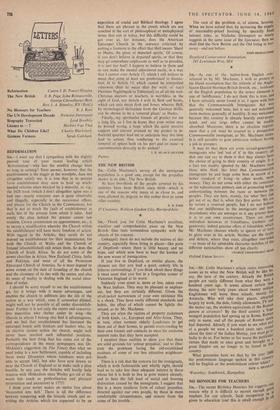Reformation Canon J. D. Pearce-Higgins The New British S. B.
Page, John Brimacombe, George Chowdharay-Best, Rev. J. A. Bromley, RN (Reid.) No Honours for Teachers R. J. Rees The UN Development Decade Nicholas Davenport Biography Travestied Lord Booth by Licence to —? Herbert Van Thal What Do Children Like? Charily Blackstock German Farmers Sarah Gainham REFORMATION
Sus,—I must say that I sympathise with the slightly peevish tone of your recent leading article 'Reformation'—why has the needful change been so long in coming? Your answer, however, that the establishment is the nigger in the woodpile, does not altogether satisfy me. It is true that in its present form establishment does seem to hold up much- needed reforms when blocked by a minority, as, e.g., the 1928 book (which I don't altogether agree was a bad one—nearly everyone uses it quite cheerfully and illegally, especially in the occasional offices, and prayer for the Church in the Communion), but that is not so much the fault of establishment as such, but of the present form which it takes. And surely the plan behind the present canon law revision, Crown commission on appointments, etc., is to secure a modification whereby the Church within the establishment will have more freedom of action. With regard to the Articles, they surely do not depend on establishment for their maintenance, for both the Church of Wales and the Church of Ireland (disestablished) still retain them. So does the Church of South Africa. So do not some of the newer churches in Africa, New Zealand, China, India and Pakistan, and most of all the Protestant Episcopal Church of America. So it must depend to some extent on the date of founding of the church and the closeness of its ties with the centre, and also its sense of reality in dealing with the social situa- tion of today.
I should be sorry myself to see the establishment go, for it brings with it many advantages, and enables the church to infiltrate into the life of the nation in a way which, even if somewhat diluted, might well not be possible at all under disestablish- ment. Further it is not only the centre and conserva- tive minorities who shelter under its wing—the liberals to whom I belong also find it advantageous, and we feel that establishment has leavened the episcopal bench with thinkers and leaders who, on an elective system within the church, might well never have reached such influential positions. Probably the best thing that has come out of the correspondence in the many newspapers was Dr. Micklem's suggestion (in The Times) that what we need today is a new Settlement, capable of including those many Dissenters whose forebears were not able to accept 1662, but who have now drawn so near the Church of England as to make such a plan feasible. In any case the Articles will hardly help reunion with Methodism since Wesley got rid of the worst bits (such as predestination and physical resurrection and ascension) in 1775!
I think your writer makes an undue fuss about 'descended into hell.' There is all the difference between tampering with the historic creeds and re- writing the Articles which are supposed to he an exposition of credal and Biblical theology. I agree that there are phrases in the creeds which are not couched in the sort of philosophical or metaphysical terms that suit us today, but this difficulty could be got over as, for instance, does the American Episcopal Church in the sentence criticised by putting a footnote to the effect that Hell means 'Sheol or Hades, the place of departed spirits.' Of course, if you don't believe in departed spirits, or that they may go somewhere unpleasant as well as to paradise, it is just too badl I happen to believe in them and so can make the mental adjustment easily, in a way that I cannot over Article 17, which I still believe to mean. that some at least are predestined to damna- tion, Or to Article 13, which cannot be interpreted otherwise than to mean that the work of (say) Florence Nightingale (a Unitarian), or of all the non- Christian doctors or teachers, is worthless in the sight of God, nor Article 4 with its flesh and bones, which can only mean flesh and bones, whereas Hell, by etymological derivation from the German Hone, can be shown to be a 'covered place,' so Hades.
Finally,, my. spiritualist friends all predict for me a long life, so I live in hopes that your writer may be proved wrong, a 'hope which the quite massive support and interest aroused by my protest in in- fluential quarters lead me to anticipate may this time lead to action, thus conducing to the eventual removal of spleen both on his part and on mine—a consummation devoutly to be wished!
J. D. PEARCE-HIGGINS Putney


































 Previous page
Previous page